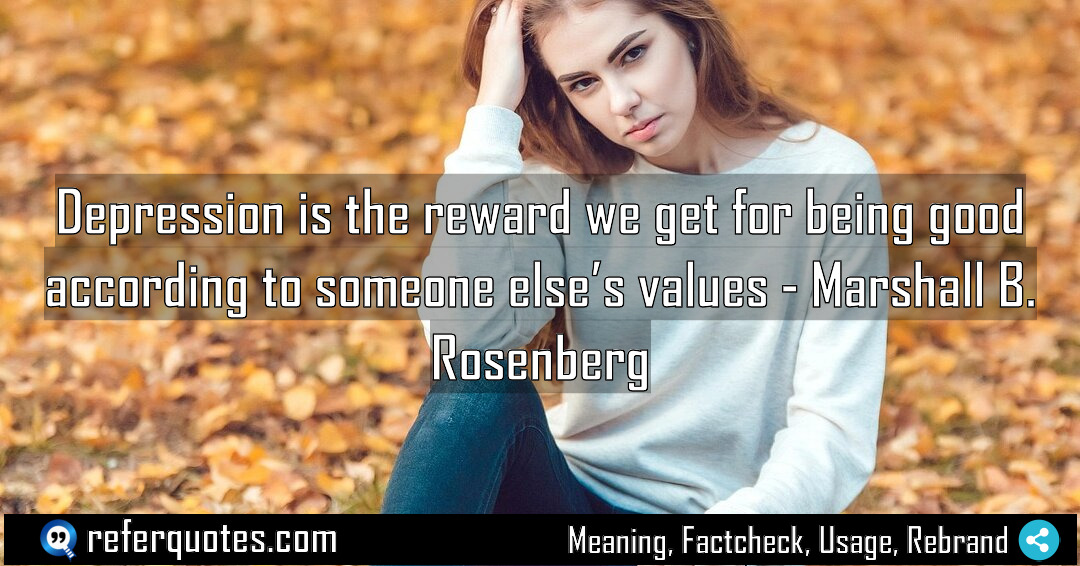
Depression is the reward we get… sounds harsh, right? But it’s a powerful truth. Rosenberg is pointing out that when we abandon our own needs to live by someone else’s rulebook, the emotional cost is immense. It’s a recipe for internal collapse.
Share Image Quote:
Table of Contents
Meaning
At its core, this quote suggests that depression isn’t a personal failure, but a natural, albeit painful, consequence of betraying our own authentic selves to meet external expectations.
Explanation
Let me break this down. I’ve seen this play out so many times. We’re taught from a young age to be “good.” Good means getting good grades, landing a prestigious job, being the “nice” person who never says no. But here’s the kicker—if those goals and behaviors aren’t aligned with what we genuinely value and need, we’re essentially outsourcing our soul. We’re running on someone else’s fuel. And when you do that for years, the system breaks down. The “reward” for all that compliance isn’t happiness; it’s a deep, profound emptiness. It’s the soul’s way of going on strike. It’s not clinical depression in every case, but it’s a depressive state born from a life of inauthenticity.
Quote Summary
Reading Level85
Aesthetic Score85
Origin & Factcheck
This is a direct quote from Marshall B. Rosenberg’s seminal work, Nonviolent Communication: A Language of Life. The book, which has become a cornerstone in psychology and communication circles, was first published in the United States in 1999. You won’t find this attributed to anyone else; it’s pure Rosenberg.
Attribution Summary
Where is this quotation located?
| Quotation | Depression is the reward we get for being good according to someone else’s values |
| Book Details | Publication Year: 1999; ISBN: 9781892005038; Last edition: 3rd Edition (2015); Number of pages: 264. |
| Where is it? | Chapter 9: Connecting Compassionately with Ourselves, Page 157 (2015 edition) |
Context
Rosenberg places this idea within the framework of his Nonviolent Communication (NVC) model. He argues that when our actions are driven by external “shoulds,” demands, and the fear of punishment or hope for reward, we are disconnected from our own compassionate nature. Depression, in this light, is a signal that we are not honoring our own fundamental needs.
Usage Examples
This isn’t just theory; it’s incredibly practical. You can use this insight in a few ways:
- For the Burnt-Out Professional: Talk to the lawyer who followed their parents’ dream and is now miserable. This quote helps them reframe their struggle from “I’m weak” to “My values are not being met.”
- In Personal Relationships: For the people-pleaser who feels drained after every family gathering because they’re suppressing their true opinions to keep the peace. It names the cost of that behavior.
- As a Personal Check-In: When you feel that low-grade sadness or numbness, ask yourself: “Whose values am I living by right now? Is this truly me?” It becomes a diagnostic tool for authenticity.
To whom it appeals?
Share This Quote Image & Motivate
Motivation Score80
Popularity Score90
Shareability Score85
Common Questions
Question: Is Rosenberg saying all depression is caused by this?
Answer: Absolutely not. He’s not dismissing the complex biochemical and trauma-related roots of clinical depression. He’s highlighting a specific, pervasive *type* of emotional suffering that comes from a life of disconnection from self.
Question: So, does this mean we should just ignore all societal rules and be selfish?
Answer: Great question, and it’s a common pushback. NVC isn’t about selfishness; it’s about self-connection. The goal is to move from “I have to do this” (external coercion) to “I choose to do this because I value connection, contribution, or safety” (internal motivation). It’s a shift from obligation to purposeful choice.
Question: How do I even know what my own values are?
Answer: That’s the real work, isn’t it? Start by noticing when you feel resentful, drained, or depressed after an activity. That’s a huge clue that an external “should” is at play. Then, ask what need of yours wasn’t met. Was it autonomy? Authenticity? Peace? That need points directly to a core value.
Similar Quotes
Happiness is just another form of gratitude is a powerful reframing of what it means to be truly happy. It shifts the focus from acquisition to appreciation, suggesting that joy…
Happiness is the consequence of personal effort. It’s not a passive state you stumble into, but an active pursuit you build. You have to fight for it, strive for it,…
When we numb hard feelings, we numb joy… it’s a truth I’ve seen play out countless times. You can’t selectively shut down pain without also dimming your capacity for happiness.…
When we help ourselves, we find moments of happiness… but it’s helping others that unlocks a deeper, lasting sense of fulfillment. It’s the difference between a quick hit and a…
Life is more pleasant when we focus on what we need. It’s a simple but profound shift that turns frustration into clarity and blame into actionable steps. This idea, from…
